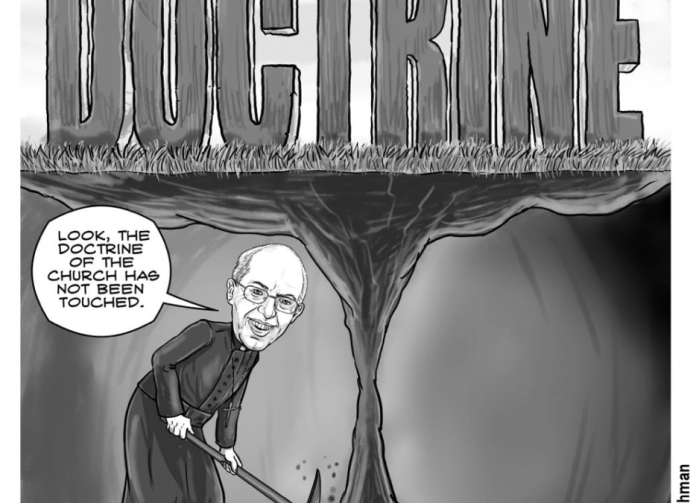All ecclesiastical jurisdictions possess doctrinal distinctives. For Anglicans, our doctrine is simple to find. It is contained in what we call the Formularies which are the Bible, the Creeds, the Articles of Religion, the Book of Common Prayer, and the Ordinal. They are legally codified by the Canons (laws of the Church). Canon A5 in particular makes the point clearly. It is published in many places
Here it is in all its simplicity.
“The doctrine of the Church of England is grounded in the Holy Scriptures, and in such teachings of the ancient Fathers and Councils of the Church as are agreeable to the said Scriptures.
“In particular such doctrine is to be found in the Thirty-nine Articles of Religion, The Book of Common Prayer, and the Ordinal.”
It says nothing about being subject to opinion polls or synodical democracy.
The early Councils and ancient Fathers gave us our three Creeds, The Apostles’, The Nicene, and The Creed of Athanasius. They determined which books were Canonical and at the English Reformation the Reformers gave us our Articles of Religion and the Book of Common Prayer and Ordinal.
Article XX puts it succinctly.
“THE Church hath power to decree Rites or Ceremonies, and authority in Controversies of Faith: And yet it is not lawful for the Church to ordain any thing that is contrary to God’s Word written, neither may it so expound one place of Scripture, that it be repugnant to another. Wherefore, although the Church be a witness and a keeper of holy Writ, yet, as it ought not to decree any thing against the same, so besides the same ought it not to enforce any thing to be believed for necessity of Salvation.”
The oft used legal test of the reasonableness of a position by the “man on the Clapham omnibus” works with the matters at hand. The man on the Clapham omnibus would have no problem in understanding where our doctrines are derived as long as he looked to the official standards. The problem is that too few are looking to the standards and rather turn to faux experts who blithely replace our standards and intentionally confuse with an ever shifting array of new theories and examples of lived experience that support their pet sins.
What the Church is facing right now is a tsunami of confrontations rephrasing the original question of disobedience as recorded in Genesis. You remember, the one where Satan asked Eve, “Did God really say …?” The constant and insistent questioning has one effect, it undermines the authority our standards as they are found in the Bible and Articles of Religion.
One commentator said that some bishops are trying to play a Jedi mind trick by making a distinction between marriage and holy matrimony. That seems patently true.
The majority of the bishops’ are promulgating a view is that Holy Matrimony is a sacrament and held in a church. They want us to believe that civil same-sex marriages are not the same because they are held elsewhere. Never before has the Reformed and Protestant Church of England made such a distinction.
The BCP uses the terms interchangeably and Article 25 says,
“There are two Sacraments ordained of Christ our Lord in the Gospel, that is to say, Baptism, and the Supper of the Lord.
“Those five commonly called Sacraments, that is to say, Confirmation, Penance, Orders, Matrimony, and extreme Unction, are not to be counted for Sacraments of the Gospel, being such as have grown partly of the corrupt following of the Apostles, partly are states of life allowed in the Scriptures; but yet have not like nature of Sacraments with Baptism, and the Lord’s Supper, for that they have not any visible sign or ceremony ordained of God.”
We are heartened by the statements from new Bishop of Ebbsfleet as well as by the Bishop of Lancaster but even more in remembering that the Church belongs to our Lord Jesus Christ. In spite of how things might look, he will not be defeated.
We do take note of the outstanding bravery of a member of General Synod from Coventry Diocese, Mr Sam Margrave. He holds forth for biblical doctrine even when the Bishop of Coventry reports him to the police and when the Archbishops of the Church send him a letter of rebuke. He is an example of what Christian Englishmen were once known for—standing for truth even in the face of an adversity.
As the Apostle Paul said to Timothy, “Watch your life and doctrine closely.” 1 Timothy 4:16. None of the Apostles instructed Christians to pick and choose which doctrines they would follow, let alone instruct them to weaken the foundation of the Church by undermining those with which they disagreed.



